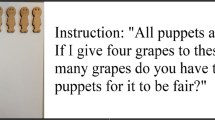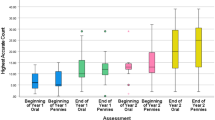Abstract
This study was designed to investigate children’s abilities to count and make quantitative comparisons. In addition, this study utilized reasoning questions (i.e., how did you know?). Thirty-four preschoolers, mean age 4.5 years old, participated in the study. According to the results, 89 % of the children (n = 30) were able to do rote counting and 70 % (n = 24) were able to do rational counting. When children were asked how they knew how many objects were in a set, 30 responded that they used a counting strategy. Sixty-five percent of children (n = 22) answered “zero” when no block was given and 21 children answered “nothing” when they were asked what zero meant to them. About quantitative comparisons, 65 % of children (n = 22) answered correctly when they were asked more and less questions.


Similar content being viewed by others
References
Baroody, A. J., Lai, M., & Mix, K. S. (2006). The development of young children’s early number and operation sense and its implications for early childhood education. In B. Spodek & O. N. Saracho (Eds.), Handbook of research on the education of young children (2nd ed., pp. 135–152). Mahwah, NJ: Lawrence Erlbaum Associates.
Bracken, B. (1998). Bracken basic concept scale-revised. San Antonio, TX: Psychological Corporation, Harcourt Brace and Company.
Burnett, K., & Farkas, G. (2009). Poverty and family structure effects on children’s mathematic achievement: Estimates from random and fixed effects models. Social Science Journal, 46, 297–318.
Clements, D. H., & Sarama, J. (2009). Learning trajectories in early mathematics—Sequences of acquisition and teaching. Encyclopedia on Early Childhood Development. Retrieved October 14, 2014 from http://www.eyeonkids.ca/docs/files/numeracy.pdf
Clements, D., Sarama, J., & Liu, H. (2008). Development of a measure of early mathematics achievement using Rasch model: The research-based early math assessment. Educational Psychology, 28(4), 457–482.
Constance, K. (1989). Numbers in preschool and kindergarten: Educational implication of Piaget’s theory. Washington, DC: National Association of Education for Young Children.
Copley, J. (2009). The young child and mathematics (2nd ed.). Washington DC: National Association of Education for Young Children.
Ginsburg, H. (2009). The challenge of formative assessment in mathematics education: Children’s minds, teacher’s minds. Human Development, 52(1), 109–118.
Ginsburg, H., & Baroody, A. (2003). Test of early mathematics ability. Austin, TX: Pro-ed.
Ginsburg, H., Kossan, N., Schwartz, R., & Swanson, D. (1983). Protocol methods in research on mathematical thinking. In H. P. Ginsburg (Ed.), The development of mathematical thinking. New York, NY: Academic Press.
Ginsburg, H., Lee, J. S., & Boyd, S. (2008). Mathematics education for young children: What it is and how to promote it. Society of Child Research, 22(1), 3–22.
High Scope Educational Research Foundation. (2003). High/scope preschool child observation record. Ypsilanti, MI: High Scope Educational Research Foundation.
Klibanoff, R. S., Levine, S. C., Huttenlocher, J., Vasilyeva, M., & Hedges, L. V. (2006). Preschool children’s mathematical knowledge: The effect of teacher “math talk”. Developmental Psychology, 42(1), 59–69.
Labinowicz, E. (1985). Learning from children. Menlo Park, CA: Addison Wesley.
Lee, J. (2014). Is children’s informal knowledge of mathematics important? Rethinking assessment of children’s knowledge of mathematics. Contemporary Issues in Early Childhood, 15(3), 293–294.
Lee, J., Autry, M., Fox, J., & Williams, C. (2008). Investigating children’s mathematics readiness. Journal of Research in Childhood Education, 22(3), 316–328.
Lee, J., Collins, D., & Winkelman, L. (2015). Connecting 2D and 3D: drafting blueprints, building, and playing with blocks. Young Children, 70(1), 32–35.
Lee, J., Lee, Y., & Amaro-Jimenez, C. (2011). Teaching English language learners (ELLs) mathematics in early childhood. Childhood Education, 87(4), 253–260.
Lee, J., Lee, J. O., & Collins, D. (2009). Enhancing children’s spatial sense using tangrams. Childhood Education, 86(2), 92–94.
Lee, J., Meadows, M., & Lee, J. O. (2003). What causes teachers to implement high-quality mathematics education more frequently: Focusing on teachers’ pedagogical content knowledge. Retrieved from ERIC (ED 472327).
Merrifield, M., & Pearn, C. (1999). Mathematics intervention. In Early Years of Schooling Branch (Eds.), Targeting excellence: Continuing the journey (pp. 62–70). Melbourne.
National Association for the Education of Young Children & National Council of Teachers of Mathematics. (2010). Early childhood mathematics: Promoting good beginnings. Retrieved from http://www.naeyc.org/files/naeyc/file/positions/psmath.pdf
National Council of Teachers of Mathematics. (2001). Principles and standards for school mathematics. Reston, VA: National Council of Teachers of Mathematics.
Piaget, J. (1952). The origin of intelligence in children. New York, NY: International University Press.
Purpura, D. J., & Lonigan, C. J. (2013). Informal numeracy skills: The structure and relations among numbering, relations, and arithmetic operations in preschool. American Educational Research Journal, 50(1), 178–209.
Vygotsky, L. S. (1978). Mind in society: The development of higher psychological processes. Cambridge, MA: Harvard University Press.
Weiland, C., Wolfe, C. B., Hurwitz, M. D., Clements, D. H., Sarama, J. H., & Yoshikawa, H. (2012). Early mathematics assessment: Validation of the short form of a prekindergarten and kindergarten mathematics measure. Educational Psychology, 32(3), 311–333.
Woodcock, R., McGrew, K., & Mather, N. (2001). Woodcock–Johnson III Tests of achievement. Itasca, IL: Riverside Publishing Company.
Author information
Authors and Affiliations
Corresponding author
Rights and permissions
About this article
Cite this article
Lee, J., Md-Yunus, S. Investigating Children’s Abilities to Count and Make Quantitative Comparisons. Early Childhood Educ J 44, 255–262 (2016). https://doi.org/10.1007/s10643-015-0707-4
Published:
Issue Date:
DOI: https://doi.org/10.1007/s10643-015-0707-4




